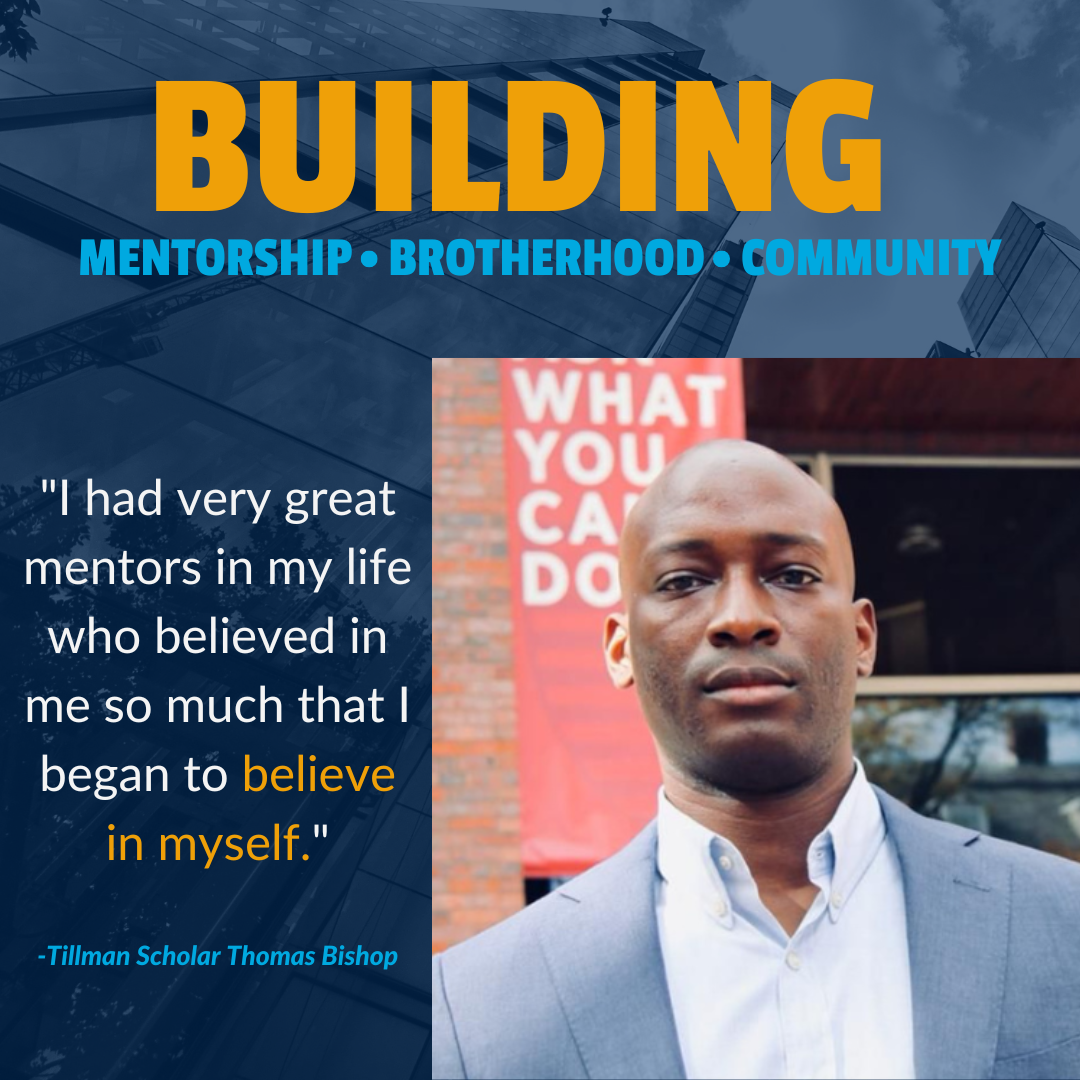Building Mentorship, Brotherhood and Community, Thomas Bishop Discussing his Nonprofit Frè Yo
Black History Month, while a time to reflect and honor on the strides and struggles of the Black community, is also a time to look to the future. This month provides the space and opportunity for everyone to come together and work for a more equitable life for the generations of African Americans to come. 2011 Tillman Scholar Thomas Bishop has recently launched a new nonprofit organization to do just that.
Frè Yo is a community and a network of people who share and give their time, talent, and resources to help connect young people with what they need to reach their goals. By creating programming that highlights education, career, and experiential opportunities they may be interested in, Frè Yo provides monthly video check-ins for its participants to learn about their accomplishments, goals, and what they need to reach those goals. The network provided helps them get the resources that they seek, whether it is paid internships, standardized testing materials, college admissions prep, resume assistance. Centered in the community of young Black men, Frè Yo also brings together mentees and mentors who identify as women, LGBTQ+, and whit and includes mentees from North America, Africa, Asia, and other paes.
Frè Yo, translating to “The Brothers” in Haitian Creole, was inspired by Thomas’ experiences at Harvard Kennedy School. His involvement in programs connecting Black undergraduate students inspired him to stay focused on this mission.
Bishop’s own mentors helped shape the leader he is today. He credits them, as well as fellow Tillman Scholars, for providing the guidance and resources for the launching of this nonprofit organization.
“Two mentors that come to mind that helped shape the person I am today. One was a former supervisor who took the effort to take time to teach, coach, and mentor me. But more than that, she took me to other leaders and said, ‘This is Thomas Bishop, he’s going to do great things so I want to connect you so that he has more people in his network.’ She did it so much I started to believe her. She then took me to another mentor, a General, who asked me one question, ‘What do you want to do?’ After I told him, he picked up the phone and made it happen. That taught me that instead of telling young people what they need to do, our jobs should be to listen to them, encourage them, and not just show them the doors of opportunity, sometimes it’s important to open those doors. Community means that I’ve leaned on all my networks including PTF to help me along the way. Whether it is Trevor Prophet, helping lead professional development sessions on entrepreneurship, Saul Bautista volunteering his time and talent, networking and sharing scholarship information with Christina Fishback, or the support I’ve gotten from the PTF and many others. I hope to continue connecting with all of the scholars and their networks to give these young people the support they need to reach their goals.
Bishop sees Frè Yo as an opportunity for cyclical involvement. It is his hope that the inspiration and guidance mentees receive will lead to them being the next generation of mentors as well as growing into the space of helping the formerly incarcerated down their new path.
“In five years, this organization will be run by former mentees, giving back and helping new cohorts of young people to apply to schools, get financial aid, get professional development exposure, and more. The real dream for this organization, is to create a sustainable model for the formerly incarcerated. Helping young people of color changes our community, but helping the formerly incarcerated, I believe can help change this nation. Last week, one of our brothers, a man who was incarcerated for 22 years received an admission letter to Columbia Law School. This man came out of prison with a plan. He is currently a senior (in his 40s) at Berkeley. I met him last year at a party and didn’t think about it. I told him that he had the ability to get into Harvard Law and if he needed any help, I would be happy to help him. We reviewed his essays, connected him with people at Columbia and Harvard Law who understood the process and could tell him more about the interview process and the law school experience. While I would never take credit for the work he did to get here, just having the support of people who believed in him and worked with him on his journey gave him the confidence that we could make his dream come true. His acceptance will inspire so many other formerly incarcerated people.”
To learn more about the work Thomas Bishop is doing, or to get involved, check out their website here!




